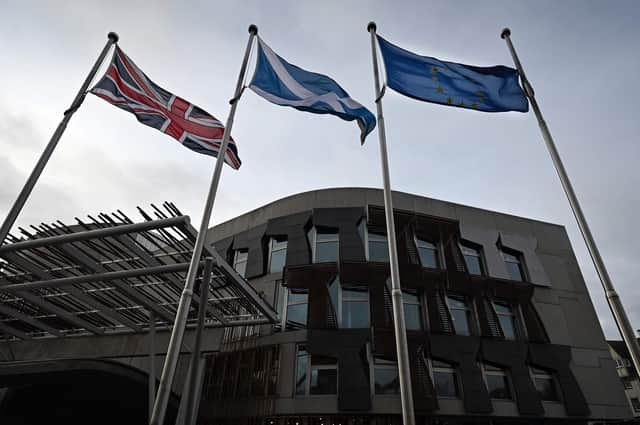Brexit: Peers told judges will decide on disputed powers


The House of Lords was told that legal disputes between governments would be resolved through the courts – though it was not specified which courts – and no new dispute resolution procedure would be established.
Opposition MPs have been calling for such a system to be organised to arbitrate on disagreements around common frameworks where legislation is already devolved, such as air quality and agriculture, but where standards were set by Brussels.
Advertisement
Hide AdAdvertisement
Hide AdWhile Business Secretary Alok Sharma has already introduced proposals for a UK internal market earlier this month, he has avoided the issue of disagreement arbitration. However his government colleague Lord Martin Callanan, today told peers that judges would decide.
Responding to Plaid Cymru’s Lord Wigley question about the need for a dispute resolution system with all four nations having an equal voice, he said: “I hope there won’t be any disputes, but if there were they would be legal disputes and the correct forum for resolving legal disputes is through the court system.
“We have no intention of setting up an alternative dispute resolution procedure when we have one of the best and most efficient court systems in the world to resolve disputes.”
Reacting to the statement, Kirsten Oswald MP, the SNP’s Westminster Deputy leader, said it was “confirmation that the UK government has no intention of meaningfully engaging with the devolved governments for an agreed dispute resolution system.”
She added: “It is yet another sign of the Tories total disregard for the devolved nations. The Tory government has opened the door for companies with deep pockets to challenge Holyrood legislation if we try to maintain higher standards than Westminster post-Brexit – putting at risk our key industries with the threat of the imposition of lower standard goods and produce.
“Far from strengthening the devolved nations, the UK government's internal market plans will enable the decisions of the Scottish Government to be overridden over devolved areas such as food and agriculture in Scotland."
The Scottish Government had previously said the internal market proposal, which requires all four nations to accept goods and services from other parts of the UK, even if they have set different standards locally, makes a mockery of devolution.
A message from the Editor:Thank you for reading this story on our website. While I have your attention, I also have an important request to make of you.With the coronavirus lockdown having a major impact on many of our advertisers - and consequently the revenue we receive - we are more reliant than ever on you taking out a digital subscription.Subscribe to scotsman.com and enjoy unlimited access to Scottish news and information online and on our app. With a digital subscription, you can read more than 5 articles, see fewer ads, enjoy faster load times, and get access to exclusive newsletters and content. Visit https://www.scotsman.com/subscriptions now to sign up.
Advertisement
Hide AdAdvertisement
Hide AdOur journalism costs money and we rely on advertising, print and digital revenues to help to support them. By supporting us, we are able to support you in providing trusted, fact-checked content for this website.
Joy Yates
Editorial Director
Comments
Want to join the conversation? Please or to comment on this article.